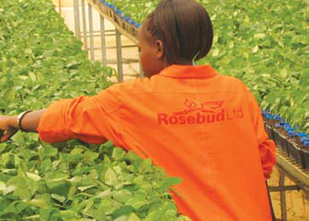 Two of the 18 Ugandan flower growers and exporters participated in the third International Floriculture Trade Expo (IFTEX) which was held at Oshwal Center, in Parklands, Nairobi. The farms are Rose Bud Limited and Mairye Estate.
Two of the 18 Ugandan flower growers and exporters participated in the third International Floriculture Trade Expo (IFTEX) which was held at Oshwal Center, in Parklands, Nairobi. The farms are Rose Bud Limited and Mairye Estate.
Rosebud Limited, located off Entebbe Road, the largest exporter of Sweetheart cut roses from East Africa and largest exporter of roses from Uganda. The farm produces approximately 40% of total Ugandan flower exports. Mairye, which is located in Ntinda Village, Busukuma Subcounty, Wakiso District, produces about half that amount. Sivalingam Ravi Kumar, the Farm Manager, Rose Bud Limited says IFTEX’s growing popularity shows that there is a fundamental shift in the floriculture market towards Africa with Kenya as the hub, something he says Ugandan flower farmers can take advantage of.
“As Ugandan exhibitors, we will showcase and promote Ugandan flowers to international buyers because so many international flower buyers do not even know that there are serious flower farms in Uganda,” said an official from Mairye Estate. “Every year, we have had to travel as far as the Netherlands to participate in prestigious Hortfair exhibition to tap into the international market. We also had to open an office in the Netherlands to coordinate our sales. This exhibition has brought the international market to us,” says Ravi Kumar.
He says Rosebud, which exports 13 million stems monthly on 45 hectares of land today realized a 10% increase in sales after their participation in IFTEX last year. “We have already embarked on an expansion plan from 45 to 50 hectares which will increase our total output to 15 million stems per month. All this was in preparation for our participation in this year’s IFTEX where we hope to realise a 20% growth in direct sales.” Ravi Kumar says the anticipated growth in sales is due to the increase in international interest in the expo.
“Last year was only the second time and not many people knew about the expo. This year, however, we have more buyers from as far as Australia, USA, Russia, Singapore, Malaysia and the traditional markets in Europe – France, Germany, Italy and Holland among others.”
Juliet Musoke, the executive director, Uganda Flowers Exporters Association (UFEA), the umbrella organization bringing growers and exporters of flowers in Uganda together, says as an association, they have not participated in IFTEX and that the flower farms which took part have done so on their own. International expos of this nature are vital in creating exposure and securing market for Ugandan flowers on the highly competitive international floriculture arena.
They are an enormous promotional tool, creating a bigger export growth opportunity for Ugandan flowers especially through direct sales. UEFA says 80% of Uganda’s flower exports go to direct sales while the rest go to the auction. Flower exports which began in 1993 are the third largest non-traditional export after gold and fish today. They offer direct employment to 8,500 people and support an estimated 51,000 livelihoods with a total sub sector investment of between $80 and $100m. Of this, $20m goes back into the economy in the form of taxes, wages and infrastructure development.
Musoke declined to explain why UFEA officially never took part in IFTEX the obvious benefits notwithstanding but an industry insider says that most flower farms in the country are too small to make sense of such expos. “Most flower farms in Uganda can barely satisfy the markets they are serving currently and many are not really looking to expand. An expo of this nature requires capacity on the side of the flower farm to satisfy new markets and standards. Our farms lack this kind of commitment,” says the source.
